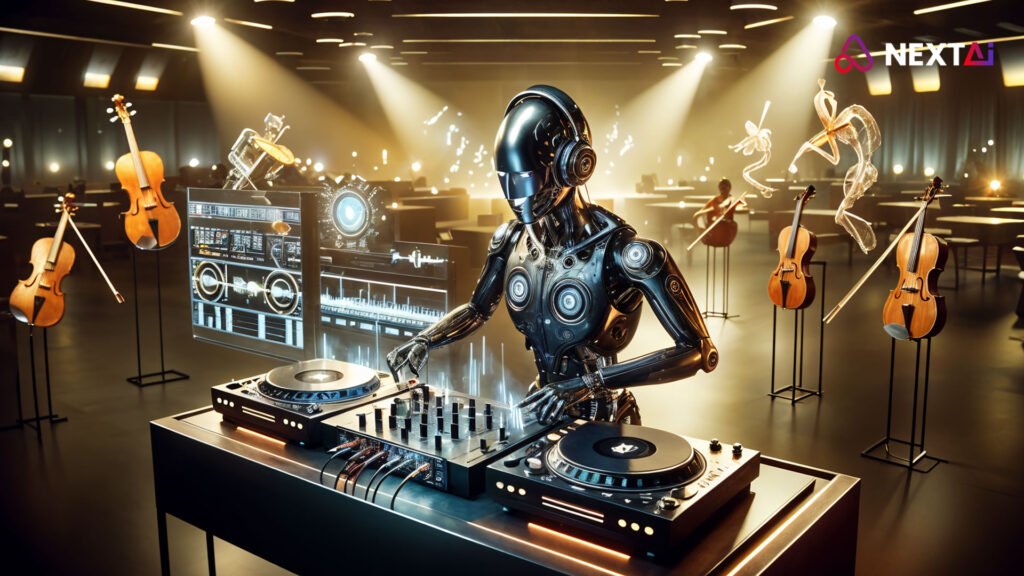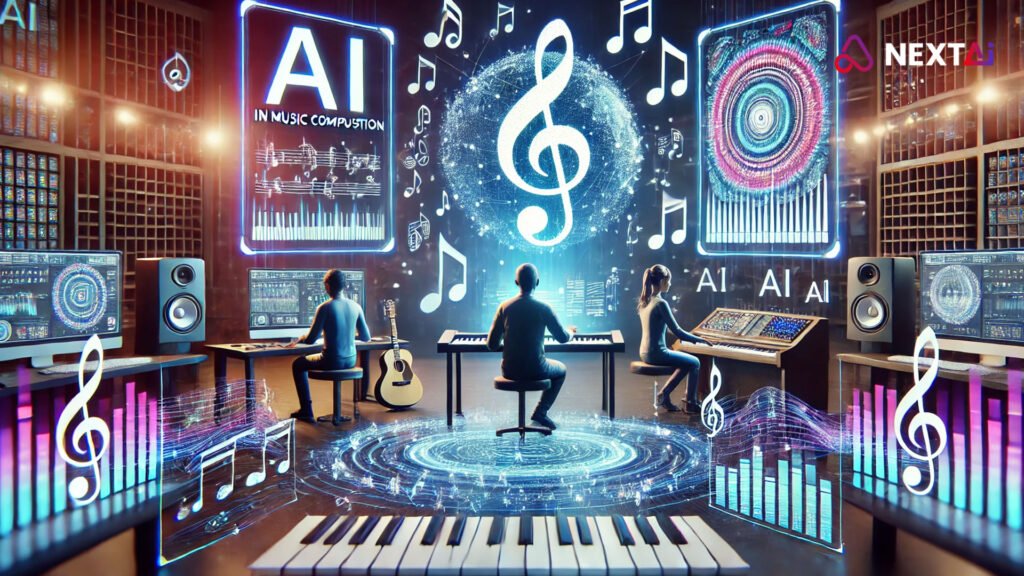By Rajiv Rajkumar Bathija – Visionary with 35 Years of Experience | AI in Music Composition
Artificial Intelligence (AI) is reshaping the music industry in extraordinary ways, pushing the boundaries of creativity and collaboration. Once seen as a field requiring purely human creativity, music composition has now embraced AI as a powerful tool. By analyzing patterns, styles, and techniques, AI is creating original compositions, enhancing musical production, and even collaborating with musicians to generate unique and innovative sounds. This blog explores how AI is transforming music composition and its implications for the future of the music industry.

AI in Music Creation
AI-powered platforms have emerged as virtual composers, creating music with incredible precision and versatility. By analyzing vast amounts of musical data, AI systems can learn the structures, rhythms, and melodies of different genres, enabling them to compose original pieces.
- Generative Music: AI tools like OpenAI’s MuseNet and Google’s Magenta use machine learning to generate music that spans genres and styles. For instance, MuseNet can compose a symphony reminiscent of Mozart or create a jazz piece infused with modern pop elements. These AI models can generate hours of music, offering artists and content creators endless possibilities.
- Adaptive Music for Media: AI has found a significant role in creating adaptive music for video games, films, and advertisements. Tools like AIVA (Artificial Intelligence Virtual Artist) compose music tailored to specific moods or scenes, enhancing the storytelling experience. For example, a game developer can use AI to create dynamic soundtracks that change based on in-game events, providing a more immersive experience for players.
AI as a Collaborative Partner
Rather than replacing human composers, AI is emerging as a creative collaborator, enhancing and complementing human creativity.
- Enhancing Creativity: Musicians can use AI tools to overcome creative blocks, experiment with new styles, or generate fresh ideas. Platforms like Amper Music allow artists to input parameters like tempo and mood, enabling AI to create a base composition that artists can refine further. This collaboration between human intuition and AI innovation often results in groundbreaking musical creations.
- Personalized Music: AI systems can analyze an artist’s previous work to create music that aligns with their unique style. For instance, pop stars and DJs are using AI to remix their tracks or generate accompaniment that matches their signature sound.
- Real-Time Interaction: AI is also being integrated into live performances. Tools like IBM Watson Beat can analyze audience reactions in real time and suggest adjustments to tempo, instrumentation, or melody, allowing musicians to tailor their performances to the audience’s mood.
AI in Music Production and Distribution
AI is not limited to composition; it is also transforming how music is produced and distributed.
- Mixing and Mastering: AI tools like LANDR automate the mixing and mastering process, delivering studio-quality results without the need for expensive equipment or extensive technical expertise. These tools democratize music production, enabling independent artists to produce high-quality tracks at a fraction of the cost.
- Personalized Playlists: AI algorithms power streaming platforms like Spotify and YouTube Music, curating playlists based on individual user preferences. These systems analyze listening habits and recommend songs, helping listeners discover new artists while boosting visibility for musicians.
- Music Rights and Licensing: AI is also being used to detect copyright infringements and manage licensing. For example, tools like Audible Magic can scan millions of audio files to identify unauthorized use, protecting artists’ intellectual property.
Benefits of AI in Music Composition
The integration of AI into music composition brings numerous benefits to artists, producers, and listeners alike:
- Endless Creativity: AI generates an infinite variety of compositions, enabling artists to explore styles and genres they might not have considered otherwise.
- Accessibility: AI tools make music creation accessible to those without formal training, empowering aspiring musicians to express themselves.
- Efficiency: AI automates time-consuming tasks like mastering and soundtrack creation, freeing up artists to focus on creativity.
- Enhanced Personalization: Listeners benefit from highly personalized music recommendations, while artists gain insights into audience preferences.
Challenges and Ethical Considerations
While AI’s role in music is exciting, it also raises important questions:
- Originality and Ownership: Who owns the rights to music created by AI? Should it be the developer, the user, or the AI itself? These questions remain unresolved and could reshape the legal landscape of music rights.
- Creative Authenticity: Critics argue that AI-generated music lacks the emotional depth and human connection of traditional compositions. Striking the right balance between AI’s efficiency and human artistry is essential.
- Algorithmic Bias: AI’s outputs are only as diverse as the data it’s trained on. If training data lacks representation from certain cultures or genres, AI may inadvertently exclude or misrepresent them.
The Future of AI in Music
The future of AI in music composition is both exciting and unpredictable. As AI technologies evolve, they are likely to become even more integrated into the creative process, enabling deeper collaborations between humans and machines. Musicians may begin to view AI as an indispensable tool, much like traditional instruments, amplifying their ability to innovate and connect with audiences.

Ultimately, AI has the potential to democratize music creation, making it accessible to anyone with a passion for sound. As it continues to grow, AI is not just reshaping how we create music but also challenging our understanding of creativity itself. By embracing these technologies thoughtfully, we can unlock a world of musical possibilities while preserving the human essence that makes music so powerful.

